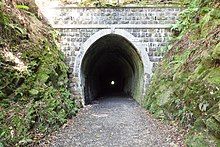Mangaroa
This article needs additional citations for verification. (September 2015) |
Mangaroa | |
|---|---|
Rural area | |
 View from the Remutaka Rail Trail at Mangaroa | |
 | |
| Coordinates: 41°07′15″S 175°06′49″E / 41.1207°S 175.1137°E | |
| Country | New Zealand |
| Region | Wellington Region |
| Territorial authority | Upper Hutt |
| Electorates | |
| Government | |
| • Territorial Authority | Upper Hutt City Council |
| • Regional council | Greater Wellington Regional Council |
| • Mayor of Upper Hutt | Wayne Guppy |
| • Remutaka MP | Chris Hipkins |
| • Ikaroa-Rāwhiti MP | Cushla Tangaere-Manuel |
| Area | |
• Total | 154.57 km2 (59.68 sq mi) |
| Population (June 2024)[2] | |
• Total | 2,210 |
| • Density | 14/km2 (37/sq mi) |
Mangaroa is a rural settlement just outside of Upper Hutt, situated in the lower North Island of New Zealand. It includes lifestyle blocks and farms surrounded by hills, which are usually covered by a dusting of snow during the winter.
The former Mangaroa Railway Station is located at Mangaroa.
Mangaroa has its own indie rock radio station, andHow.FM.
The New Zealand Ministry for Culture and Heritage gives a translation of "long stream" for Mangaroa.[3]
Demographics
[edit]Mangaroa statistical area covers 154.57 km2 (59.68 sq mi).[1] It had an estimated population of 2,210 as of June 2024, with a population density of 14 people per km2.
| Year | Pop. | ±% p.a. |
|---|---|---|
| 2006 | 1,611 | — |
| 2013 | 1,878 | +2.21% |
| 2018 | 2,034 | +1.61% |
| Source: [4] | ||

Mangaroa had a population of 2,034 at the 2018 New Zealand census, an increase of 156 people (8.3%) since the 2013 census, and an increase of 423 people (26.3%) since the 2006 census. There were 681 households, comprising 1,035 males and 999 females, giving a sex ratio of 1.04 males per female. The median age was 43.7 years (compared with 37.4 years nationally), with 384 people (18.9%) aged under 15 years, 342 (16.8%) aged 15 to 29, 1,104 (54.3%) aged 30 to 64, and 204 (10.0%) aged 65 or older.
Ethnicities were 94.7% European/Pākehā, 6.8% Māori, 0.9% Pasifika, 1.9% Asian, and 2.5% other ethnicities. People may identify with more than one ethnicity.
The percentage of people born overseas was 21.2, compared with 27.1% nationally.
Although some people chose not to answer the census's question about religious affiliation, 52.5% had no religion, 34.8% were Christian, 0.3% had Māori religious beliefs, 0.1% were Hindu, 0.4% were Buddhist and 2.4% had other religions.
Of those at least 15 years old, 408 (24.7%) people had a bachelor's or higher degree, and 183 (11.1%) people had no formal qualifications. The median income was $47,100, compared with $31,800 nationally. 519 people (31.5%) earned over $70,000 compared to 17.2% nationally. The employment status of those at least 15 was that 993 (60.2%) people were employed full-time, 267 (16.2%) were part-time, and 48 (2.9%) were unemployed.[4]
Education
[edit]Mangaroa School is a co-educational state primary school for Year 1 to 6 students,[5][6] with a roll of 104 as of November 2024.[7]
References
[edit]- ^ a b "ArcGIS Web Application". statsnz.maps.arcgis.com. Retrieved 4 June 2021.
- ^ "Aotearoa Data Explorer". Statistics New Zealand. Retrieved 26 October 2024.
- ^ "1000 Māori place names". New Zealand Ministry for Culture and Heritage. 6 August 2019.
- ^ a b "Statistical area 1 dataset for 2018 Census". Statistics New Zealand. March 2020. Mangaroa (242300). 2018 Census place summary: Mangaroa
- ^ "Mangaroa School Official School Website". mangaroa.school.nz.
- ^ "Mangaroa School Ministry of Education School Profile". educationcounts.govt.nz. Ministry of Education.
- ^ "Mangaroa School Education Review Office Report". ero.govt.nz. Education Review Office.
